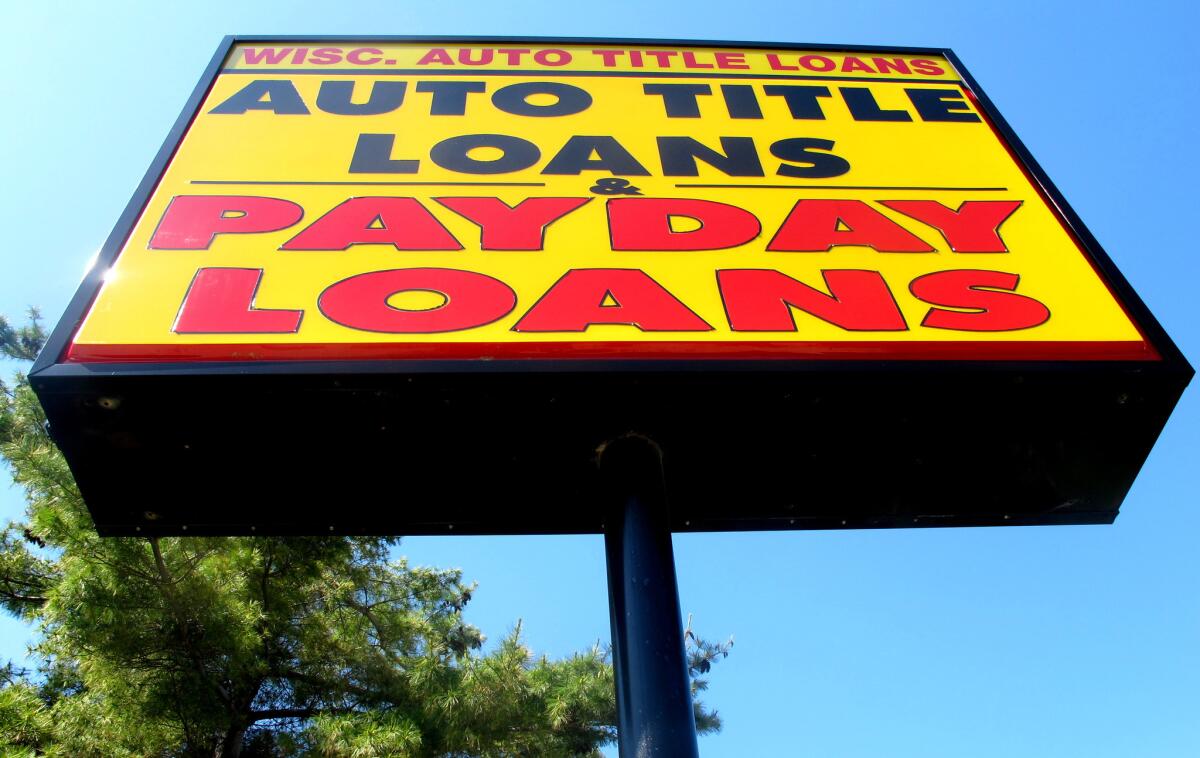Consumer watchdog turns its attention to auto-title loans

Payday loans aren’t the only type of expensive consumer credit that start out as a short-term financial solution but often turn into long-term debt traps, according to a report released Tuesday by the Consumer Financial Protection Bureau.
Consumers who take out auto-title loans often are unable to pay by the due date and refinance repeatedly to retain possession of their vehicles, the bureau found after analyzing millions of loans. Even then, about 1 in 5 borrowers lose their wheels, according to the analysis.
The report is the latest in a series of studies released by the federal agency as it pushes for a broad set of new rules governing companies that provide short-term consumer loans, typically at high interest rates. The bureau is expected to release proposed rules in the coming weeks.
Previous reports have focused on payday lenders and the consequences of payday loans, such as bank overdraft fees related to missed payments. The latest report turns its attention to a different, though similar class of lenders that would also be subject to the bureau’s proposed rules.
“Although these [auto-title] products are usually marketed for short-term financial emergencies, the long-term costs of such loans often just make a bad situation even worse,” CFPB Director Richard Cordray said during a Tuesday conference call with reporters. “These loans ... present issues that are similar to those we have found with payday loans.”
The report focused specifically on single-payment auto-title loans, which are akin to payday loans in that they are expected to be repaid in a lump sum, typically after one month.
Compared with payday loans, auto-title loans tend to be larger and have slightly lower interest rates, though they come with a big catch: Borrowers have to put up collateral for these loans, giving the lender the right to take their car if they can’t pay.
Single-payment auto-title loans are available in 20 states, including Oregon, Nevada and Arizona, though they are not offered in California.
The report did not look at so-called installment auto-title loans, which are typically larger than single-payment loans and are structured to be paid off over time. CFPB researcher Jesse Leary said the bureau is also studying that type of loan, which is available in California.
The bureau examined about 3.5 million single-payment auto-title loans issued between 2010 and 2013. Those loans, on average, were for just under $1,000 and had annual interest rates of just under 300%. A previous CFPB report found payday loans averaged less than $400 with interest rates of about 340%.
The report found that when auto-title loans come due, borrowers had to take out new loans, often from the same lender, to pay off the old ones. Most took out at least three consecutive loans, and some took out 10 or more in a row, leaving them indebted for months instead of weeks.
That’s similar to the CFPB’s findings in reports about payday loans, which are structured to be repaid on the borrower’s next payday. Paying back the loan often leaves borrowers in the hole again and they can wind up borrowing multiple times over many months. The CFPB and consumer advocacy groups have called such loans “debt traps.”
Part of the attraction of auto-title and payday loans is that they offer cash in a hurry. A Pew Charitable Trusts report on auto-title lending found that customers choose lenders based not on their prices but on speed and convenience.
Some auto title lenders advertise that they don’t check a borrower’s credit at all, requiring only that borrowers own their cars outright and that the vehicles pass an inspection.
The coming CFPB rules probably would force lenders to change that practice.
A draft of the proposed rules released last year calls for requiring lenders to look at borrowers’ income and expenses to make sure they have enough income left over to afford loan payments. The rules also would limit the number of times a loan can be refinanced – a move that the industry contends would cut off credit to some borrowers.
The rules would apply to all loans that must be paid back within 45 days, as well as to longer loans that carry interest rates higher than 36% and are either backed by auto titles or repaid through automatic bank drafts.
The CFPB’s report on payday lenders questioned the practice of collecting payments directly from borrowers’ bank accounts using electronic debits. The report found that about half of all borrowers missed at least one payment, resulting in overdraft fees or other charges from their banks. On average, those borrowers paid bank fees totaling $185 over 18 months.
The CFPB’s proposal is expected to call for lenders to notify customers before trying to collect a payment from a bank account.
Dennis Shaul, chief executive of payday lending trade group Consumer Financial Services Assn. of America, told a congressional subcommittee in February that the CFPB’s rules would drive some lenders out of business and leave potential borrowers without access to quick credit they need for emergencies.
“The bureau seems unaware that these products emerged because customers have urgent needs, and that those needs will not disappear even if the lenders offering those products do,” Shaul said.
See more of our top stories on Facebook >>
MORE FROM BUSINESS
Robert Shapiro reveals what O.J. Simpson said after his court verdict was read
Lending Club may lend more of its own money amid new scrutiny
Obama administration announces final overtime rule, boosting pay for millions
Twitter: @jrkoren







